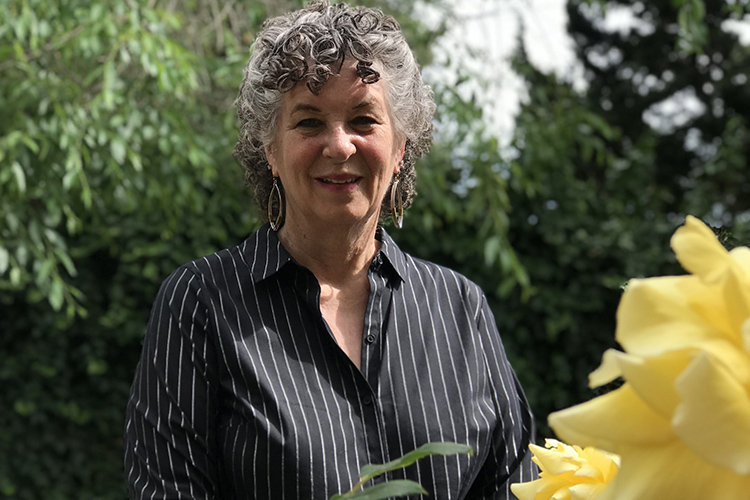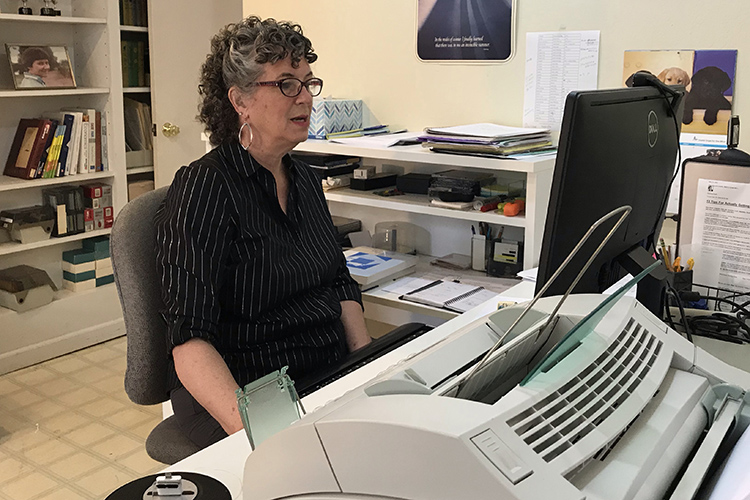You need a lecture: Martha Olney’s ‘The Covid Days’ for 2020 grads
"Don't let spring 2020 take away your hope for the future," she said, "and your memories of the past"

May 4, 2020
During this COVID-19 pandemic, a lecture might feel like the last thing you need. Didn’t you get enough of them this semester, or during your college years, or from your elders?
If you instead crave a laugh, empathy and encouragement, words of wisdom, a compliment and even a hug, you’ll still discover all of that in “The Covid Days,” a talk given last Friday by Martha Olney, a UC Berkeley teaching professor of economics. She’d been chosen by the Senior Class Council to deliver the annual Last Lecture, the final event in a week of activities the council plans for graduates each spring.
This year, all of Senior Week was virtual, from workouts to game and movie nights to writing senior “wills” to leave memories, traditions and hopes behind for younger students and friends.
Speaking to graduating seniors via a Zoom webinar from her basement home office, Olney acknowledged the difficulty since March of teaching remotely, unable to be with her students in class and to realize the moment “when everyone’s listening, and (when I know) I’ve got you, … and you can (hear a pin) drop. … You can’t do that in your basement.”
“My goal in teaching is about changing lives. You can’t change lives that you can’t see,” she said. “We need human connection, casual conversation, and you can’t have that on Zoom.”

Martha Olney, a Berkeley teaching professor of economics, said we should help graduating students “acknowledge what they’ve lost and that their grief is real, understandable, deserved …and allow them the space to discern their path, which may be a new path, in light of life’s events” during the COVID-19 crisis. (Photo by James Olney)
Still, Olney bridged that gap with her invisible Last Lecture audience, sharing messages targeted at students graduating during a pandemic. “This is awful, it sucks, it’s terrible. No graduation, no commencement,” she said, “This was not the way senior year was supposed to end.”
She urged students to not let the past two months define their college experiences, which for the Class of 2020 meant much more than COVID-19 — the 2016 presidential election, the Milo (Yiannopoulos) violence on campus, two years of California wildfires and smoky Berkeley skies, PG&E power shutoffs and other weighty news events.
Instead, she outlined, a few times with slides — it was a lecture, after all — the four stages of intellectual and ethical development that help students evolve from memorizing facts, as presented by a teacher, to being able to take a stand and generate one’s own knowledge, backed up by logic and evidence.
“Think back to being 17, 18, 19, and see that you’re a different person,” she said. “It’s like, ‘Damn, I did learn a lot!'”
Olney asked students to now bring those learning skills to bear in the COVID-19 crisis: “No matter what field you’re in, you have something to contribute. You have something to bring to bear on what we’re living with today.”
As an economist, she said she felt compelled to address the “economics of this moment” in the world, and the troubled job market. She presented four stages — from the stoppage of economic activity in the shelter-in-place stage, to the social distancing stage that “will take a while … I put in my head 2022, so I can be happy when it’s over sooner,” she said — to the “PTSD (post-traumatic stress disorder) phase,” when people’s behavior, including spending, will remain cautious, to, finally, the “new normal.”
“This is going to be a really tough job market. I’m really sorry. Recoveries are going to be scattered by industry,” she told students. “But this is a delay and not a permanent stop. And this difficult job market is not about you. … It’s about global forces outside of your control. Believe in yourself, hold your head up and know it will eventually end. Don’t let spring 2020 take away your hope for the future and your memories of the past.”

When asked by the Senior Class Council to deliver the 2020 Last Lecture, Martha Olney said, “I was honored, humbled, excited, nervous, grateful.” But then, the pandemic shut down campus and, she said, “I was worried I wouldn’t be able to provide the wisdom in this moment that I think they are seeking.” But the students say she delivered. (Photo by James Olney)
Olney also shared Elisabeth Kübler-Ross’ five stages of grief — denial, anger, bargaining, depression and acceptance — from the famous psychiatrist’s book “On Death and Dying,” saying these stages are “relevant to what’s going on right now.”
She also spoke about a good death versus a bad death, in terms of how people reflect on a loved one’s death and dying after they’ve gone. “It’s about how those of us who survive … process and package the memories of the death itself, and recall the good stuff that happened before,” she said.
Unfortunately, the pandemic, for us, will be “like a bad death,” she added, “which will make it harder to package and process what we’re going through now, set it in its proper place and then recover memories of what came before. We need to remember the good stuff … there was a lot of really good stuff that happened (to the Class of 2020) — what you learned, the people you met, how the world expanded in the classroom, and a lot outside the classroom.”
She asked students to use this time, sheltered in place wherever they are, to “think about what we’ve lost. What is it we’re grieving? If we can process (that) … we can determine what’s important and what we want to experience in the future.”
Olney said students may discover, as they reflect, they’re on the right career path. Or, they may reevaluate what to do with their lives, perhaps making a radical change of plans.
“No matter whether you stick with your life path or change it, you’ve gained so much in your time here at Berkeley and will always have the memories, experiences that made you who you are today,” she said. “It may be a bit delayed, but you will go out into the world. And you’re going to go into the world as a Golden Bear, as a Berkeley graduate, and use your knowledge and passion to make the world a better place.”
Following her lecture, Olney answered a wide variety of questions from students — more than 200 seniors tuned in — via the Zoom chat feature. Among the topics were what she enjoys in life besides teaching, her must-read books (she has 18), how she’s handling the COVID-19-related cancellation of women’s college and professional basketball — a passion of hers, and why students should register for fall semester if online teaching continues.